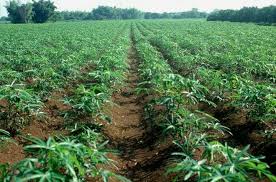FCTA set to utilise 274,000 hectares of farm lands

In a bid to ensuring economic boost and diversification of internally generated revenue for the Federal Capital Territory Administration, the present administration is indeed exploring agricultural opportunities to ensure full utilization of the entire lands mapped out for agriculture in the capital city.
This is also in response to numerous hews and cries over perceived wrong allocation of farm lands to structural developers in the FCT.
The administration, in a recent launch of farm inputs to farmers across the FCT, reiterated its commitment to ensuring sustainable food security for residents of the FCT through the implementation of necessary policies that will help to harness the vast agricultural potentials of FCT and transform the sector into one that will enable wealth creation, employment for the teeming youths and provide a boost for foreign exchange earning not just for the FCT but the country at large.
This is the sole responsibility of Agriculture and Rural Development Secretariat (ARDS), one of the six Secretariats of the Federal Capital Territory Administration (FCTA).
With an estimated 274,000 hectares of the Federal Capital Territory’s (FCT’s) out of the approximately 8000 square kilometers land mass earmarked for farming purposes, the nation’s capital no doubt has enormous potentials in the agricultural sector.
A curious look at this mission and potentials vis-à-vis activities of the Secretariat, in barely two years of the present FCTA, indicates that ARDS is unarguably on the right path of delivering on its mandate, at least judging by the lingering recession.
In a bid to further promote farming in Abuja, to empower the people through agriculture and ensure food security, the Administration recently flagged off sale of farm inputs at 50 per cent discount to enable small scale farmers produce more, both in quantity and quality, and as well harvest more yields. Some of these farm inputs include fertilizers, pesticides and machine tools, to mention a few.
Records have shown that it has also registered not less than 9,000 farmers who would immensely benefit from the Central Bank of Nigeria’s (CBN) Anchor Borrowers Programme, which is mainly targeted at changing the lives of small-holder farmers who are into rice and soya beans by not only lending them funds but also linking them with the market that requires their produce.
The FCTA has also provided innovative farming ideas to about 200,000 farming families and achieved average yield increase of rice from 2.0 metric tonnes per hectare to 3.5 metric tonnes with cassava witnessing increment from 16 metric tonnes per hectare to 20 metric tonnes per hectare. This is in addition to training not less than 16 village extension agents and 800 farmers across the six Area Councils of FCT.
Recruitment of 32 animal health personnel, composed of 20 veterinary doctors and 12 animal health workers, has also been carried out within this period, thereby helping to also tackle the challenge of employment through agriculture.
The Abuja Daily also reliably gathered that the Administration has approved the release of its counterpart funding for the commencement of the World Bank-assisted Fadama III Additional Financing project and has already registered about 200 farmers groups who have started benefiting from the project. Aside these, FCTA has also posted about 450 N-Power agro beneficiaries from the Office of the Vice President to drastically reduce the ratio of extension agents to farmer from 1:3,541 to 1:1000 in line with global standards.
These successes are being recorded due to the Administration’s robust partnerships with organisations such as the Japan International Cooperation Agency, Competitive Africa Rice Initiative, British Tobacco Nigeria and the United States Agency for International Development.
Others include Food and Agriculture Organisation, Federal Ministry of Agriculture and Rural Development, CBN, Notore Fertilizer Company, National Association of Nigeria Traders, among others.








